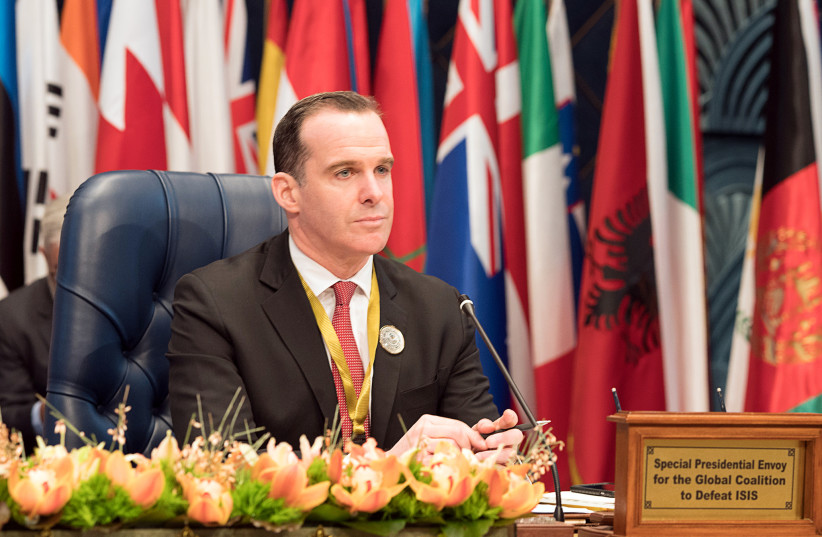US Middle East envoy Brett McGurk plans to visit Egypt and Israel to help push forward a hostage deal and ensure plans for Palestinian civilian safety in any IDF military operation in Gaza’s Rafah.
“We are again in very sensitive negotiations that we hope will bear fruit soon, to be able to get these hostages out and get an extended pause [to the Gaza war] in place,” White House National Security Communications Adviser John Kirby told reporters on Tuesday.
McGurk is “heading to the region. He’ll be in Egypt tomorrow [Wednesday], then in Israel the next day,” Kirby said, explaining that the “principal focus of his efforts is to try to get that hostage deal in place.”
Kirby spoke following an announcement by Hamas that a delegation headed by its leader Ismail Haniyeh was in Cairo for hostage talks along with the Deputy Chairman of Hamas in Gaza, Khalil al-Hayya
Qatar: Medicine sent to Gaza given to hostages
In a step toward Israel, Hamas updated Doha that the medicines sent to Gaza for the hostages last month were being delivered to the captives, Qatar’s Foreign Ministry reported, but no proof was provided.

Prime Minister Benjamin Netanyahu, however, declared that Israel would not pay any price for a deal, as the war cabinet met in Tel Aviv on Tuesday night.
“We very much want to achieve another release, and we are prepared to go far, but we are not prepared to pay any price, certainly not the delusional prices that Hamas is demanding of us, the meaning of which is the defeat of the State of Israel,” Netanyahu said.
He stressed that there was “considerable pressure on Israel at home and abroad to stop the war before we achieve all of its goals, including a deal at any price to free the hostages.
“We are committed to continuing the war until we achieve all of its goals: eliminating Hamas, releasing all of the hostages, and ensuring that Gaza never again constitutes a threat to Israel.
“There is no pressure, none, that can change this,” Netanyahu said.
Finance Minister Bezalel Smotrich posted on X that the only way to return the captives was to destroy Hamas and win the war.
“Those who call for a deal at any cost will cause Israel to be defeated in the war and will also remove the chance of returning the captives home,” Smotrich stated.
Relatives of the hostages rallied outside of the war cabinet meeting, calling for Israel to send a delegation to Cairo to engage in talks.
US vetoes UN Security Council resolution for Gaza ceasefire
In New York, the United States vetoed a United Nations Security Council resolution put forward by Algeria which called for a permanent ceasefire in Gaza.
Kirby told reporters that passage of the resolution could have put the negotiations at risk, explaining that this was not the right “time for a ceasefire”, particularly given that it would leave Hamas in control of Gaza and remove any incentive for it to free the remaining 134 hostages captured on October 7.
The best way forward is a hostage deal that would pause the war and allow for the entry of increased humanitarian aid into Gaza, Kirby said.
“We don’t believe that the Hamas leadership should be able to get off scot-free here after what happened on the seventh of October,” Kirby said as he referred to the Hamas massacre in southern Israel.
The US wants Israel to succeed in destroying Hamas, he said, but it also must ensure the protection of civilians as it does so, including in Rafah.
“We understand that there are Hamas units and leaders who have migrated down to Rafah as a result of the fighting in Khan Yunis” and that Hamas fighters were using civilians as human shields.
Due to this situation, Israel must present a credible plan to protect these civilians, Kirby said, as he stressed that this was a necessary step to secure US support for that operation.
“We would not support an operation that put those people at greater deliberate and greater risks,” Kirby said, as he explained that this is one of the topics McGurk will discuss with Israeli officials this week.
“Our principal concern here is that, under the current circumstances, without properly accounting for the safety and security of those refugees, we continue to believe that an operation in Rafah would be a disaster,” Kirby said.•
